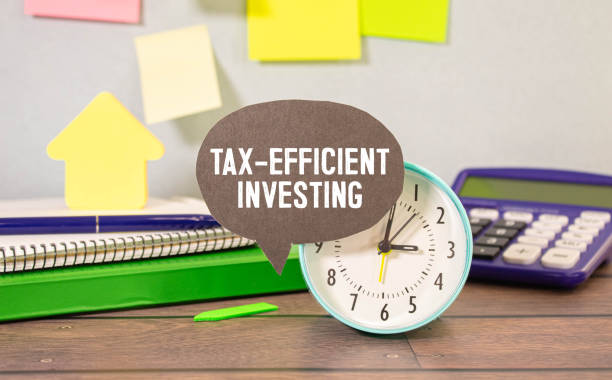“Tax-Efficient Investing: Maximizing Returns and Minimizing Liabilities” embarks on a journey into the realm of finance where strategic financial planning intersects with the complexities of the tax code. In the world of investments, taxes are an inevitable part of the equation, and understanding how to optimize your investments to minimize tax liabilities while maximizing returns is a crucial skill for investors of all levels.
This exploration delves into the intricate interplay between investment decisions and the tax landscape, highlighting the importance of tax-efficient strategies in wealth accumulation and preservation. It is a testament to the belief that what you keep after taxes is often just as significant, if not more so, than what you earn before taxes.
Throughout this journey, we will uncover the tools and tactics available to investors to legally and intelligently minimize their tax burdens. From tax-advantaged accounts like IRAs and 401(k)s to strategies for tax loss harvesting and capital gains management, this guide will empower you with the knowledge and insights to navigate the tax terrain with confidence.

The objective is clear: to ensure that your investment portfolio not only thrives but does so while preserving more of your hard-earned capital. Join us in exploring the realm of “Tax-Efficient Investing,” where prudent financial decisions meet the art of tax optimization, leading to a more prosperous financial future.
Understanding the tax implications of your investments
Understanding the tax implications of your investments is a fundamental aspect of financial planning and wealth management. Taxes are an inescapable part of the investment landscape, and they can significantly impact your overall returns. It’s essential to be well-informed about how different types of investments are taxed, as this knowledge can help you make more tax-efficient choices and ultimately preserve more of your investment gains.
One key consideration in understanding tax implications is the difference between short-term and long-term capital gains. In many tax jurisdictions, short-term gains, which are generated from investments held for one year or less, are typically taxed at higher ordinary income tax rates. In contrast, long-term gains, from investments held for more than one year, often benefit from lower capital gains tax rates. This distinction can significantly affect the after-tax returns on your investments and should inform your investment holding periods.
Sector Analysis: Identifying Opportunities in Different Industries.
Another crucial aspect of tax-aware investing is the impact of dividends and interest income. The tax treatment of these types of income can vary depending on the source. Qualified dividends from U.S. corporations often receive preferential tax rates, while interest income, such as that from bonds or savings accounts, is typically taxed at your regular income tax rate. Investors should carefully consider the tax efficiency of their income-producing investments and evaluate their suitability within their overall portfolio.
Moreover, the choice of investment accounts can have substantial tax implications. Tax-advantaged accounts like Individual Retirement Accounts (IRAs) and 401(k)s offer tax benefits such as tax-deferred growth or, in the case of Roth IRAs, tax-free withdrawals in retirement. Making strategic decisions about where to hold different types of assets can optimize your tax situation. For example, holding high-growth, high-tax investments in tax-advantaged accounts and tax-efficient assets in taxable accounts can be a tax-efficient strategy.

Furthermore, investors should be aware of the impact of capital losses. Capital losses can offset capital gains, reducing your overall tax liability. However, the rules surrounding the use of capital losses can be complex, and it’s essential to understand them fully to make the most of tax-loss harvesting strategies.
In conclusion, comprehending the tax implications of your investments is a critical component of effective financial planning. It allows you to make informed decisions about your investment holding periods, the types of income your investments generate, the choice of investment accounts, and the strategic use of capital losses. By integrating tax-aware strategies into your investment approach, you can maximize after-tax returns, ultimately helping you achieve your financial goals more efficiently.
Tax-efficient investment strategies
Tax-efficient investment strategies are essential tools in the arsenal of savvy investors who aim to preserve more of their wealth while complying with the complexities of the tax code. These strategies are designed to minimize tax liabilities and maximize after-tax returns. Here are some key tax-efficient investment strategies:
Utilize Tax-Advantaged Accounts: Tax-advantaged accounts like Individual Retirement Accounts (IRAs), 401(k)s, and Health Savings Accounts (HSAs) offer significant tax benefits. Contributions to these accounts are often tax-deductible or made with pre-tax dollars, and investment gains within these accounts grow tax-deferred or, in the case of Roth accounts, can be withdrawn tax-free in retirement. Maximizing contributions to these accounts is a cornerstone of tax-efficient investing.
Strategic Asset Location: Allocating assets strategically across different types of accounts can minimize taxes. High-growth, high-tax investments may be best held in tax-advantaged accounts, while tax-efficient assets can be placed in taxable accounts. This approach allows investors to take advantage of lower tax rates on long-term capital gains and qualified dividends.
Tax-Loss Harvesting: Tax-loss harvesting involves selling investments that have experienced losses to offset capital gains. By strategically realizing losses, investors can reduce their overall tax liability. It’s important to adhere to tax rules governing wash sales, which prevent buying back the same or substantially identical securities within a specific period.
Asset Location for Income Needs: When generating retirement income, consider the tax efficiency of income sources. For example, withdrawing from taxable accounts before tax-advantaged accounts can delay tax obligations and allow tax-advantaged assets to continue growing.
Invest in Tax-Efficient Funds: Some investment vehicles, such as index funds and exchange-traded funds (ETFs), are inherently more tax-efficient than actively managed funds. They tend to generate fewer capital gains distributions, reducing taxable events for investors.
Municipal Bonds: Municipal bonds (munis) offer interest income that is often exempt from federal taxes and, in some cases, state and local taxes. They can be an attractive addition to a tax-efficient investment portfolio, especially for investors in higher tax brackets.
Long-Term Holding: Holding investments for the long term can lead to favorable tax treatment. Long-term capital gains often receive preferential tax rates compared to short-term gains. Patient investors can benefit from lower tax liabilities when they hold investments for over a year.
Charitable Giving: Charitable contributions can be an effective tax-efficient strategy. By donating appreciated securities, investors may be able to avoid capital gains tax while supporting charitable causes. Additionally, contributions to donor-advised funds can provide immediate tax deductions while allowing flexibility in distributing donations over time.
In conclusion, tax-efficient investment strategies are a crucial part of financial planning. They enable investors to optimize their tax positions, minimize tax liabilities, and enhance after-tax returns. Implementing these strategies requires careful consideration of asset location, account selection, tax-loss harvesting, and other tax-optimization techniques. By incorporating tax efficiency into their investment approach, individuals can better align their portfolios with their financial goals and achieve greater wealth preservation over time.
Tax-efficient investment vehicles
Tax-efficient investment vehicles are essential tools for investors looking to minimize their tax liabilities while optimizing their investment returns. These vehicles are specifically designed to offer tax advantages and can play a crucial role in achieving long-term financial goals.
One of the most common tax-efficient investment vehicles is the Individual Retirement Account (IRA). IRAs come in various forms, including Traditional IRAs, Roth IRAs, and SEP IRAs, each offering unique tax benefits. Traditional IRAs allow for tax-deductible contributions, tax-deferred growth, and tax considerations upon withdrawal in retirement. Roth IRAs, on the other hand, offer tax-free withdrawals in retirement, making them a popular choice for tax-efficient retirement savings. SEP IRAs are designed for self-employed individuals and small business owners, providing a tax-advantaged way to save for retirement.
Additionally, 401(k) plans are widely used tax-efficient investment vehicles offered by employers. These retirement accounts enable employees to contribute pre-tax dollars, reducing their current taxable income while saving for the future. Many employers also match a portion of employee contributions, further enhancing the tax benefits.
Tax-efficient exchange-traded funds (ETFs) and index funds are investment vehicles that inherently generate fewer capital gains distributions compared to actively managed funds. This tax efficiency is due to their passive management style, which results in lower portfolio turnover. Investors in ETFs and index funds can benefit from reduced tax consequences, allowing more of their returns to compound over time.
Another tax-efficient investment vehicle is the Health Savings Account (HSA). HSAs are designed to help individuals save for medical expenses while enjoying tax advantages. Contributions to HSAs are tax-deductible, and withdrawals used for qualified medical expenses are tax-free. Furthermore, any unused funds in an HSA can be invested and grow tax-deferred, making it a valuable tool for both immediate healthcare expenses and long-term retirement savings.

Municipal bonds, often referred to as munis, are debt securities issued by state and local governments. They offer interest income that is typically exempt from federal taxes and, in some cases, state and local taxes for residents of the issuing municipality. Munis can be an attractive addition to a tax-efficient investment portfolio, especially for investors in higher tax brackets seeking tax-exempt income.
In conclusion, tax-efficient investment vehicles are integral components of a well-rounded investment strategy. They offer a range of tax advantages, from deferred taxation in retirement accounts like IRAs and 401(k)s to tax-free withdrawals in Roth IRAs and HSAs. Tax-efficient funds such as ETFs and index funds reduce capital gains distributions, while municipal bonds provide tax-exempt income. By incorporating these vehicles into their investment approach, individuals can enhance their after-tax returns and work toward their financial objectives more efficiently.
Tax planning for investors
Tax planning for investors is a critical aspect of financial strategy that aims to minimize tax liabilities and maximize after-tax returns on investments. By strategically managing their investments and understanding the tax implications, investors can keep more of their hard-earned money and achieve their financial goals more efficiently.
One fundamental aspect of tax planning for investors is selecting the right investment accounts. Different types of accounts offer varying tax advantages. For example, Individual Retirement Accounts (IRAs) and 401(k)s provide tax-deferred growth or tax-free withdrawals in retirement, making them valuable tools for long-term retirement savings. Roth IRAs offer tax-free withdrawals in retirement, making them suitable for tax-efficient income planning. Taxable brokerage accounts are flexible but subject to capital gains and dividend taxes. By strategically choosing the right accounts based on their goals and tax situation, investors can optimize their tax position.
Asset location is another critical consideration in tax planning. Allocating investments strategically across different account types can minimize tax liabilities. Tax-efficient assets, such as index funds and tax-efficient ETFs, are best held in taxable accounts to take advantage of favorable tax rates on long-term capital gains and qualified dividends. On the other hand, tax-inefficient assets, like actively managed funds with high turnover, are better suited for tax-advantaged accounts, where their taxable gains can be shielded from current-year taxation.
Furthermore, tax-loss harvesting is a valuable strategy in tax planning. By realizing capital losses strategically, investors can offset capital gains and reduce their overall tax liability. Tax-loss harvesting involves selling investments that have declined in value to generate losses that can be used to offset gains. This technique can be particularly effective in taxable accounts, where it can lead to substantial tax savings.
Investors should also consider the timing of their investment decisions. Holding investments for the long term can result in more favorable tax treatment, as long-term capital gains often receive preferential tax rates compared to short-term gains. Investors can minimize taxes by avoiding excessive trading and focusing on a buy-and-hold strategy for appropriate assets.

Lastly, staying informed about changes in tax laws and regulations is essential for effective tax planning. Tax codes can evolve, and new tax-saving opportunities may arise. Consulting with tax professionals or financial advisors who are well-versed in tax matters can be valuable in navigating the complexities of tax planning and ensuring compliance with current tax laws.
In conclusion, tax planning for investors is a strategic approach that can significantly impact an individual’s or institution’s financial success. By selecting the right investment accounts, strategically allocating assets, implementing tax-loss harvesting strategies, considering investment holding periods, and staying informed about tax laws, investors can optimize their tax positions and achieve greater after-tax returns, ultimately helping them reach their financial objectives more efficiently.
Working with a tax advisor
Working with a tax advisor is a prudent step for individuals and businesses alike, as it can provide valuable expertise and guidance in navigating the complex and ever-changing landscape of tax regulations. A tax advisor is a professional who specializes in tax planning and compliance, offering a range of services from preparing tax returns to providing strategic tax advice. Here are some key reasons why working with a tax advisor is beneficial:
First and foremost, tax advisors possess a deep understanding of tax laws and regulations. They stay up-to-date with the latest changes in tax codes, deductions, and credits, ensuring that their clients take advantage of all available tax-saving opportunities. This knowledge is invaluable, as it can result in substantial tax savings and help clients avoid costly mistakes and penalties.
Tax advisors can tailor tax strategies to each client’s unique financial situation and goals. Whether it’s optimizing deductions, managing capital gains, or structuring business transactions, they provide personalized advice that aligns with their clients’ objectives. This level of customization ensures that clients make informed decisions that benefit their specific financial circumstances.
Another significant advantage of working with a tax advisor is the reduction of stress and time saved. Tax compliance can be a time-consuming and complex process, often causing anxiety for individuals and business owners. Tax advisors take on the responsibility of preparing and filing tax returns accurately and on time, relieving clients of this burden and allowing them to focus on their core activities.
Tax advisors can also provide valuable financial planning guidance beyond just filing tax returns. They help clients make informed financial decisions that consider the long-term tax implications of investments, retirement planning, estate planning, and more. This holistic approach ensures that clients have a comprehensive financial strategy that aligns with their tax goals.
Furthermore, tax advisors can represent clients in dealings with tax authorities, such as during audits or disputes. Having a knowledgeable advocate by your side can be invaluable when facing complex tax issues, helping to resolve disputes more favorably and efficiently.
In conclusion, working with a tax advisor offers numerous benefits, from expert tax knowledge and personalized tax strategies to stress reduction and time savings. Tax advisors play a vital role in helping individuals and businesses navigate the intricate world of taxation while optimizing their financial positions. Their guidance and expertise contribute to informed decision-making, tax savings, and overall financial well-being.
Conclusion
In conclusion, “Tax-Efficient Investing: Maximizing Returns and Minimizing Liabilities” illuminates the vital intersection of prudent financial strategy and tax optimization. It underscores the undeniable truth that what you keep after taxes can significantly impact your long-term financial success. For investors, the journey towards wealth accumulation and preservation is incomplete without a comprehensive understanding of tax-efficient investment strategies and thoughtful tax planning.
Through the exploration of tax-efficient investment vehicles, strategies, and the role of tax advisors, this guide has empowered individuals and businesses to navigate the complexities of the tax landscape with confidence. By leveraging tax-advantaged accounts, strategically allocating assets, employing tax-loss harvesting, and seeking professional guidance, investors can achieve greater after-tax returns, minimize tax liabilities, and align their financial strategies with their unique objectives.
In a world where tax codes are continually evolving, working in tandem with a tax advisor becomes an essential partnership that helps ensure compliance, optimize tax positions, and strategically plan for the future. Tax-efficient investing is not just about maximizing returns; it’s about securing a brighter financial future and realizing your financial aspirations while preserving your hard-earned wealth.
As investors continue to navigate the intricacies of financial markets and tax regulations, the principles of tax-efficient investing remain a guiding light. With the right knowledge, strategies, and partnerships in place, individuals and businesses can embark on a path toward greater financial prosperity and a future where every dollar invested is maximized, and every tax liability minimized.








